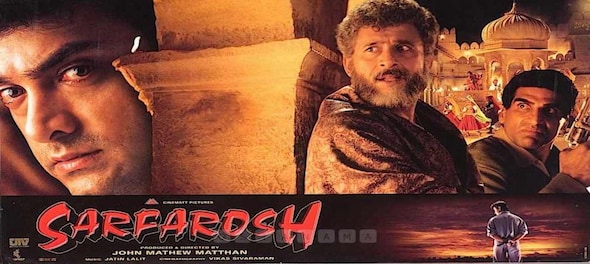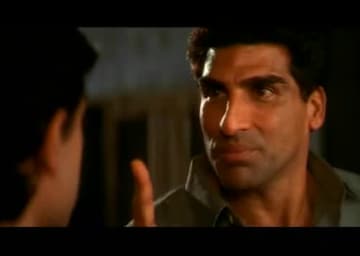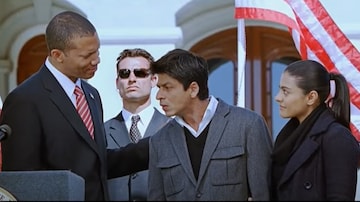
Remember Rishi Kapoor’s lovable Akbar from 'Amar Akbar Anthony'? Or Karisma Kapoor’s effervescent eponymous protagonist from 'Zubeidaa'? Also Madhavan’s Farhan Qureshi, an engineering student with a deep love for wildlife photography, from '3 Idiots', and Shreyas Talpade’s adolescent cricket wonder-boy from 'Iqbal'? Memorable as all these characters are, they have one more thing in common, binding them in a delicate thread.
They are all Muslims unencumbered by the need to sacrifice themselves to prove their goodness or their love for the country. A precious, endangered category that’s now on the brink of extension. When was the last time you watched a Muslim in a Hindi film who was not a terrorist, gangster, quisling, despot, petty criminal, or an audacious patriot?
It’s been a while.
Though Bollywood had never been shy of making Muslim characters either live in apology for being who they are or pay the price for it, 'Sarfarosh', which released 23 years ago, was a landmark film in cementing the sentiment. Directed by John Matthew Matthan, whose most acclaimed work it is, 'Sarfarosh' stars Aamir Khan as ACP Ajay Singh Rathore, a righteous cop on a mission to stop cross-border terrorism.
The 1999 film revolves around an important case of arms smuggling that he is put in charge of after his colleague Saleem Ahmed (played by Mukesh Rishi) fails to nab a key terrorist. Ahmed is not only removed from the case but is also accused of letting the militant go because of being a fellow Muslim. This hurts Ahmed’s pride and wounds his patriotic integrity. ACP Rathore knows he cannot crack the case without Ahmed’s incredible on-ground network and inimitable daring. But since he cannot get him on board on paper, he eggs him to prove his nationalism by helping him solve the seemingly unsolvable. Eager to remove the nasty blot on his impeccable track record, Ahmed bends over backward and ensures Rathore gets to the bottom of it.
 Mukesh Rishi, playing Saleem Ahmed in 'Sarfarosh', in a scene
Mukesh Rishi, playing Saleem Ahmed in 'Sarfarosh', in a sceneWhat gained momentum over two decades ago has become a trend now. Bollywood’s incorrigible love of straddling the good Muslim with the need to prove their goodness is only getting stronger. Such films are being milled by the minute, as religiously as can be. 'My Name Is Khan', 'Chak De! India', 'Shahid',' Kedarnath', 'Mulk', 'War', 'Raazi', 'Toofan' — the list is endless. A good Muslim is a rare occurrence in contemporary Hindi cinema. It has always been. A good Muslim whose goodness goes unquestioned is rarer still.
In 'Sarfarosh', there is a scene outside a mosque in the second half featuring good Muslim Ahmed and bad Muslim Haji Seth. Haji, a crucial part of the racket, uses their common religion Islam as the foundation of his conversation with Ahmed. He addresses him as a brother and requests him to not pick up arms against his own. To this, Ahmed launches into an explanation of what musalmaan actually means. He says, “Musalmaan ka matlab hai musallam + imaan. Yaani jiska imaan har haal me poore ka poora kayam hai. Jiska imaan chattan ki tarah mazboot hai aur shabnam ki tarah paak hai.” He goes on to add how, the two of them, despite belonging to the same religion, couldn’t be more different, and how the entire Muslim community has to bear the brunt of the acts of a few.
Every time I watch this scene, I think of Shah Rukh Khan’s Rizvan from the 2010 film 'My Name Is Khan'. An autistic Muslim married to a Hindu woman in San Franciso, he embarks on a road trip across the United States after his stepson is killed because of the growing Islamophobia in the country post 9/11. All just to tell the then US president George W Bush that his name is Khan, and he is not a terrorist.
 Shah Rukh Khan in a scene from 'My Name Is Khan'
Shah Rukh Khan in a scene from 'My Name Is Khan'Ahmed’s character in 'Sarfarosh' also reminds me of Rishi Kapoor’s Murad Ali Mohammed from the 2018 film 'Mulk'. Known and celebrated by all in his mohalla for his unshakable uprightness and pluralism, he is accused of aiding the terrorist endeavours of his nephew. Despite the longstanding goodwill, he and his family face social ostracisation and related trauma long before the judgment is out. But the last time I checked, every accused in India is considered innocent until proven guilty, isn’t it? If only.
 Rishi Kapoor in a scene from 'Mulk'
Rishi Kapoor in a scene from 'Mulk'There’s also Shah Rukh Khan’s Kabir Khan from 'Chak De! India' — a former captain of the Indian hockey team trying to regain lost glory after he is declared a traitor for missing a penalty stroke and losing the world cup to Pakistan. And then there’s Farhan Akhtar’s boxer, Aziz Ali, from 'Toofan' who faces deep-seated prejudice at the hands of his Hindu coach, whose daughter he unwittingly falls in love with. It takes her death for the coach to see past his Islamophobia.
It’s been 23 years since the release of 'Sarfarosh', but every time I watch it, I cannot help but wonder how I have never seen a Hindu explain himself or justify the piousness of his faith in a Bollywood film the way Ahmed had to in that scene outside the mosque. I also wonder if the story of 'Kedarnath' would have been possible without the death of Sushant Singh Rajput’s Mansoor Khan in the end. Or the need to kill Sehmat’s husband in Alia Bhatt’s 2018 film 'Raazi'.
Read other pieces by Sneha Bengani here.
First Published: May 2, 2022 11:51 AM IST
Check out our in-depth Market Coverage, Business News & get real-time Stock Market Updates on CNBC-TV18. Also, Watch our channels CNBC-TV18, CNBC Awaaz and CNBC Bajar Live on-the-go!


Lok Sabha Elections 2024: Can BJP repeat its poll success in Uttar Pradesh? Here's a SWOT analysis
Apr 17, 2024 7:47 PM
Lok Sabha elections 2024: Know what all is closed on April 19 for phase 1 polling
Apr 17, 2024 7:35 PM
Lok Sabha elections 2024: From Nagpur to Chhindwara, key battles in Phase 1
Apr 17, 2024 7:19 PM

